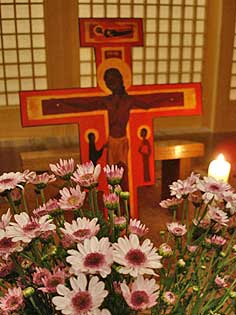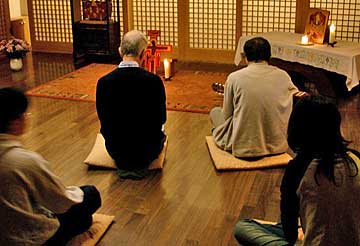One of the brothers reflects on their life together:
“With my God I can scale any wall”
Over the years we have developed a life together and put down roots. We are in touch with many people. If we try to understand our life, we are constantly aware of what is happing in the North, like the recent train disaster. We know that we are living in half a country. Historically, Korea is not two countries; it has been one country for centuries. The division between North and South is the result of the cold war, transplanted, amplified, it became terrible during the Korean War, and completely unacceptable. If you go 20 km north from where we are in Seoul, you arrive at the barbed wire and road blocks and you can’t go any further. There are not many places where you can actually see North Korea because the zone between the two countries is forbidden. From the outset it has been wide, with a strong military presence, and you can see nothing. You can look vaguely, and confide to God those who are on the other side. Yet the Korean people aspire to far more than that. One of my first memories is the words of the psalm, “With my God I can scale any wall”. I would so much like to be able to scale that wall.
A few weeks ago, I went to visit an 85 year old man in hospital. He is a poet, and was a journalist. He grew up in the North and, before the Korean War, when he wanted to publish his poems, he discovered they were not politically correct. Finally, he understood that he had to flee to the South and risk everything. He left his young wife, his elderly mother and his brother who was a Catholic priest. It was 1949. He could not imagine that he would never see them again. His wife was able to escape a short time later. But he has no news of his mother and his brother. He never saw them again and his brother certainly died in 1950.
We are living with the Korean people their very long wait for the doors to open. For over fifty years, they have been knocking on the door of this division that has no equal anywhere in the world. For us, this is very important. Two of the brothers traveling from Taizé were able to visit the North in the name of the community. We can’t do that. All we can do is to confide to God those who are there and wait for something to become possible. The Churches are committed towards the North as they are able. There are many in the North who would like to escape and find their way to the South, but that is no solution. It is a very complex business for people who have lived in the North to arrive in the very different, confused, and hard to live in society of the South.
Waiting for doors to open
In our life, North Korea is always present, as is China. Seoul is surrounded by hills, rocky, and very beautiful. But you can’t see them when they are hidden by dust from China. China suffers from enormous ecological disasters; the desertification of the North is spreading farther every year. In springtime, when the very dry winter is over, the breeze stirs up the dust of the desert and drives it well beyond Seoul. The same phenomenon occurs as far as Seattle and Vancouver: even in the USA dust from China obscures the sky. It reminds us that China is there. Nowadays, there are crowds of tourists every day who come from China to visit Korea. There too we experience a sense of longing. It is not possible to live what we would like to live with the Church in China. The Chinese can visit Korea with no difficulty, if they have the money. But it is still not easy to share with Chinese Christians as we would like to, and no one knows how long this situation will last. In our prayers, we pray for North Korea, and we pray for the Church in China.
We do not realize enough to what point South Korea is an “island”: nothing crosses the zone that cuts the country in two. From Seoul to the most southern point of the country, the distance is more or less like from Paris to Taizé, 400 kms. From Seoul, if you look towards the north-west, there is Beijing: like from London to Taizé, an hour and a half by air. To the south-west is Shanghai: an immense city, extremely modern and dynamic. Then there is Taiwan. On the other side there is Japan, which caused so mush suffering in Korea, in China and in other countries. From time to time - not often - visitors come from Japan seeking reconciliation. It is always the question of the wounds of history: we will never know how to heal these wounds, and we wait with the people for doors to open, so that we can scale the walls. In one sense, all our life in the fraternity is a life of waiting that is lived out in prayer.
“Life is beautiful, the world is good”
Among the people I see from time to time is the widow of a poet. He visited Taize five years ago. Her parents worked in Japan, in the city of Hiroshima. The 6 August 1945, her father had been summoned – a representative of each family had been summoned for early in the morning – for a large meeting in the centre of town. At 8.06, the bomb exploded above the place where the meeting was being held. There was not a single family in Hiroshima that did not lose someone.
She lost her father that day. Some weeks later they returned to Korea. Two years ago, for the first time, she returned to Hiroshima, to see the place. She is not Christian but Buddhist. She has never expressed the slightest resentment towards anyone. She has spent her life looking after this poet whose health was more than delicate: she gave her life for this man she had know from childhood. In his youth, the poet had been arrested and tortured for no reason. People who knew him in 1967 tried to make contact with the North Korean embassy in East Berlin. When this became known, he was arrested and harshly tortured; it almost killed him. In 1970, he believed he was going to die and he wrote a poem that is known by many Koreans: it is like a preparation for death. After all the suffering, the torture, the breakdown of his health, he says at the end of the poem, “The day I leave this beautiful world, I shall return to heaven and when I arrive I will say: life is beautiful, the world is good.” It counts to know that a man who had endured all this could have such a vision. Saint John of the Cross says that it is love alone that will count. The life of that man has been entirely marked by his love for his friends and his children – he loved his children very much. This capacity to scale the walls of hatred and resentment is characteristic of Korea: to discover that in spite of everything, life is beautiful and that is what is worth saying at the end. For me, to have learned this is a grace.
 TAIZÉ
TAIZÉ
